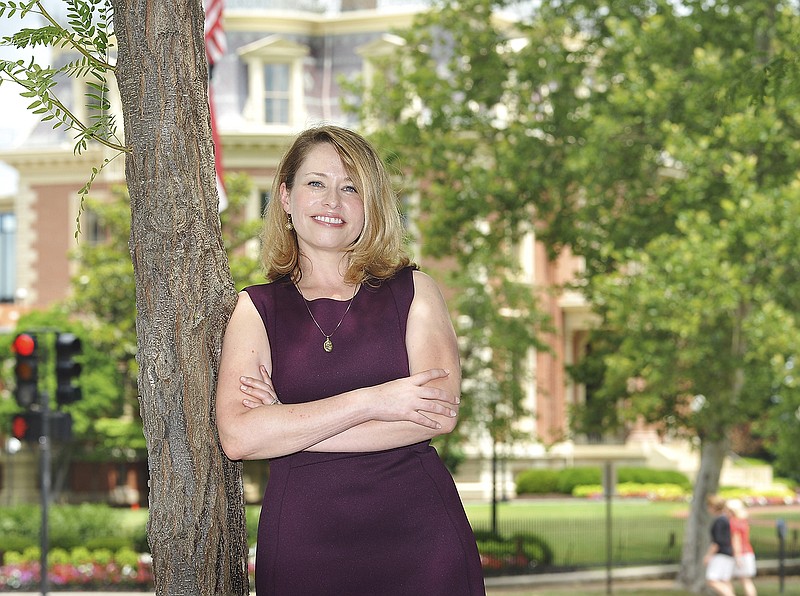History is important to Rebecca Gordon.
She's only the third director of Friends of the Missouri Governor's Mansion, a nonprofit organization that's been in existence for 44 years to preserve the mansion's history through stewardship.
Although she's been with the mansion for only four years, Gordon's background working for nonprofit organizations goes back two decades.
She started out working for a nonprofit aimed at preventing child abuse in the state and spent the last 20 years working for child welfare on a statewide level, doing child abuse prevention and intervention work.
"My job was to communicate to regular folks who really don't realize what's going on how they can get involved," she said.
She raised money and helped develop programs for organizations.
Gordon was working for Missouri KidsFirst when her son started high school. At that time, she realized she had only four years left during which he'd be home. So to stay at home more, she started a consulting company to help nonprofits across the country.
She wasn't thinking about working for another nonprofit, but her son and the son of the mansion's former director, Laura Bennet-Smith, played rugby together. Gordon did some work for Bennet-Smith. She didn't know the mansion's board had been looking for a new director for a while.
Out of the blue, she got a call from the board's director.
"I understand nonprofits a lot - their insides and outsides," she said. "How they work. The laws around them. How to raise money. What's important structurally."
What she didn't understand, she thought, was anything about history.
That concerned Gordon.
However, she began to think about what she spent her free time doing. She'd always been engaged in history. She'd read many historical books and had done her own research on and was deeply interested in the Civil War.
"I was always curious about my family and the genealogy," Gordon said. "And the Jefferson City history. I was thinking that while I don't have this great background in history of the mansion, I do have a passion for it."
The work is interesting, Gordon said.
All 60 docents are volunteers.
Running the program involves making sure all the volunteers have everything they need and that they are always prepared to give tours. The mansion welcomes about 70,000 visitors annually.
"That's day in and day out - making sure we can give great tours to anybody coming in, no matter their interests. The second part of that is that as the nonprofit, we are focused on being able to maintain the property, the mansion itself, the executive residence," Gordon said.
The organization calls it the "lipstick stuff."
The mansion is owned and maintained by the state, but anything on the inside, whether furnishings, carpeting or lamps, is paid for through money raised by the nonprofit.
"Many of the items in the mansion are owned by Friends of the Missouri Governor's Mansion," she said.
And many are rare and old.
Maintenance on anything in the mansion can cost thousands of dollars. For example, the mansion harp, which the Pillsbury family gave to the nonprofit 22 years ago, is returning to Jefferson City this week. It had been taken to Lyon and Healy Harps in Chicago to be refurbished and re-gilded at a cost of $15,000.
The nonprofit also wants to make sure all fourth-graders in the state have access to the mansion, whether or not they can be there in person.
To do this, the organization provides educational materials and worksheets. It is working with the Missouri Humanities Council - which provides programming that encourages family reading, highlights Missouri heritage, supports veterans' creative writing efforts, and assists museums and libraries to promote education - to talk to classrooms using technology.
Gordon, an adjunct professor for Fox Valley Technical College in Wisconsin, is an instructor. She teaches child sexual abuse prevention to communities across the country about four to five times per year. She was just in Houston. She'll be sent next to Charleston, South Carolina.
"They drop us in and we teach for two days," Gordon said. "And then we come home."
It helps with her perspective, she said.
In Houston, she reached law enforcement, juvenile officers, school personnel, mental health professionals and community advocates.
"What we do is get them in a room for two days and identify the problems in the community as it relates to child sexual abuse," Gordon said. "In Houston, you've got a large immigrant population."
They figure out what the problems are and develop a community plan to eradicate it. It's a step-by-step process the attendees take back to their own institutions to begin using.
"Because we're such a mobile society, I'm really never out of the loop," she said.
Putting plans together for other communities challenges her in ways that sharpen her skills used to manage all of the ebbs and flows of what's happening at the mansion, she said.
"It allow us to be really flexible," Gordon said. "It actually makes me sharper. Coming back from Houston gave me the energy and wind to continue."

